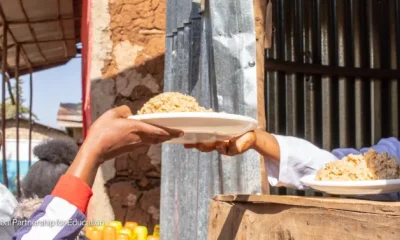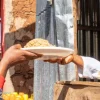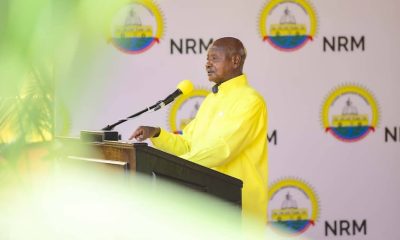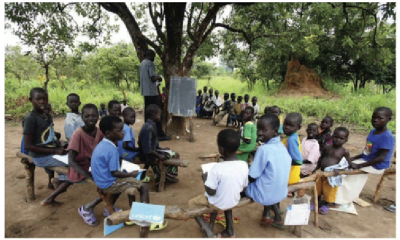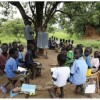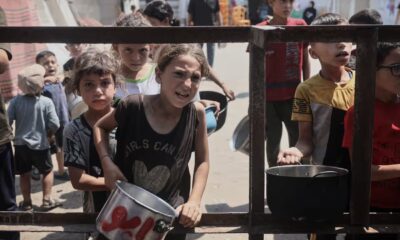News
Korea pledges to play a more active role in Uganda’s dev’t

Korea’s Ambassador to Uganda Sungsoo Park, handed over a dummy check to one of the Korea Uganda alumni Mr. Richard Migisha to implement a US$ 30,000 project on zoonotic diseases. Photo Courtesy of Mr. Alfred Kakumba
The Republic of Korea is committed to supporting Uganda’s social economic transformation through training of more civil servants and offering financial assistance to projects in the three focus areas of Health, Education and Rural development, The Sunrise has learnt.
This was revealed during speeches and presentations made at the recently held first joint gathering of Korea Uganda alumni. The gathering brought together over 500 beneficiaries of Korean scholarships.
Since reopening of their embassy in Uganda in 2011, Korea has sponsored more than 1000 Ugandans, mostly civil servants to pursue further studies in Korea.
Dr. Yona Baguma, the Director General of National Agriculture Research Organization (NARO), praised the Korean’s spirit of willingness to help other countries climb out of poverty, especially through their willingness to share knowledge.
Ambassador Sungsoo Park of the Embassy of Korea to Uganda, who officiated as the Chief Guest, hinted that they are willing to do even more to support Uganda.
Other officials from the Embassy of Korea and two of its key development agencies KOICA and KOFIH, outlined a number of initiatives worth millions of dollars which they say are aimed at supporting Uganda to achieve her ambition of attaining middle-income status.
Mr. Jaehoon Choi, Political and Development Affairs Specialist at the Embassy of Korea observed that Korea has chosen Uganda as a key partner country over the next 15 years.
He cited recent financial assistance programs that have put Uganda the second biggest recipient of Korean Aid in Africa, after Ethiopia, as testament of their commitment.
He further pointed to the recent signing of a US$500 million loan agreement by Korea to Uganda, meant for infrastructure projects, as another show of support for Uganda’s development vision.
The joint gathering of KOICA and KOFIH Alumni took place at Four Points by Sheraton Hotel in Kololo on September 28, 2024.
KOICA is short for Korea International Cooperation Agency and handles mostly government to government cooperation.
KOFIH on the other hand stands for Korea Federation of International Health and specifically fosters capacity improvement in the health sectors of their partner countries.
The colorful gathering brought together a wide range of former and current civil servants to exchange ideas that can help to improve the lives of Ugandans using their Korea experiences.
During the meeting, the staff of the Embassy of Korea as well as from its agencies KOICA and KOFIH, went at great length to outline opportunities for scholarship, funding, collaboration and knowledge sharing.
Some of the notable opportunities that came up, was the proposed establishment of an International Health Innovation Hub at Makerere University.
The US$40 million project, to be equally funded by both Korea and Uganda, aims to create a physical space for innovation in the health sector.
The proposed Makerere project, is but just one of many interventions that Korea intends to support.
Other important interventions that the government of Korea seeks to achieve include the improvement of skills and technical capacities of civil servants.
Under this area, Korea has prioritized the training of more than 1000 civil servants through scholarships in Korean universities and other training institutions.
Under Capacity Improvement & Advancement for Tomorrow (CIAT), it emerged that KOICA offers close to 100 scholarships every year to civil servants in Uganda.
The meeting had a fair share of provocative speeches from notable Ugandans.
Dr. Yona Baguma challenged fellow alumni to use their experience and knowledge of Korea, a country that was only six decades ago, an aid recipient but rapidly transformed into a world power and major aid giver, to also move Uganda along a similar path.
Dr. Baguma observed that Korea broke away from poverty the moment they broke away from the negative aspects of their culture and embraced hard work ethics and saving culture.
For former Vice President Dr. Wandira Kazibwe, she challenged the alumni to first appreciate their cultural values as the foundation for development.
Comments





